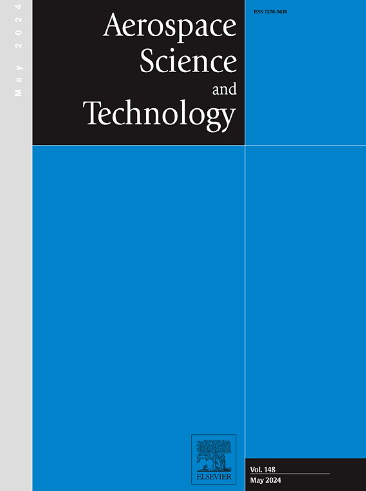Adaptive fuzzy finite-time control for a QUAV with tracking error constraints and unknown actuator faults
IF 5
1区 工程技术
Q1 ENGINEERING, AEROSPACE
引用次数: 0
Abstract
This article presents an adaptive finite-time (FT) tracking control strategy for a quadrotor unmanned aerial vehicle (QUAV) under asymmetric time-varying tracking error constraints (TECs) and unknown actuator faults (AFs). Firstly, a fractional-order nonsingular terminal sliding surface is designed and the fuzzy logic system (FLS) approximation mechanism is employed to cope with the unknown AFs and nonlinear perturbations, then relevant adaptive updating laws are provided to generate the estimation of the unknown bounds. In addition, TECs are adopted to ensure specified transient performance of the QUAV system. Specifically, an asymmetric initial state-independent barrier function is constructed, yielding a modified output constraint method, which eliminates the initial condition-dependent restriction in most of existing reports on TECs. Further, based on the synthesized adaptive controller and FT stability theory, the reachability of the designed sliding surface is achievable, and the FT convergence of the tracking error can be actualized then. Eventually, simulation results reveal that the developed control strategy can keep the tracking errors within the predefined boundaries and achieve the FT tracking with high accuracy in spite of unknown AFs.
求助全文
约1分钟内获得全文
求助全文
来源期刊

Aerospace Science and Technology
工程技术-工程:宇航
CiteScore
10.30
自引率
28.60%
发文量
654
审稿时长
54 days
期刊介绍:
Aerospace Science and Technology publishes articles of outstanding scientific quality. Each article is reviewed by two referees. The journal welcomes papers from a wide range of countries. This journal publishes original papers, review articles and short communications related to all fields of aerospace research, fundamental and applied, potential applications of which are clearly related to:
• The design and the manufacture of aircraft, helicopters, missiles, launchers and satellites
• The control of their environment
• The study of various systems they are involved in, as supports or as targets.
Authors are invited to submit papers on new advances in the following topics to aerospace applications:
• Fluid dynamics
• Energetics and propulsion
• Materials and structures
• Flight mechanics
• Navigation, guidance and control
• Acoustics
• Optics
• Electromagnetism and radar
• Signal and image processing
• Information processing
• Data fusion
• Decision aid
• Human behaviour
• Robotics and intelligent systems
• Complex system engineering.
Etc.
 求助内容:
求助内容: 应助结果提醒方式:
应助结果提醒方式:


